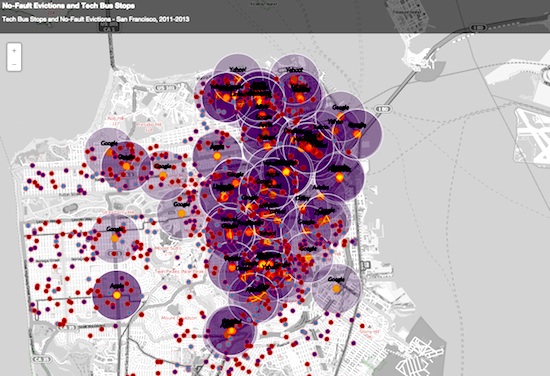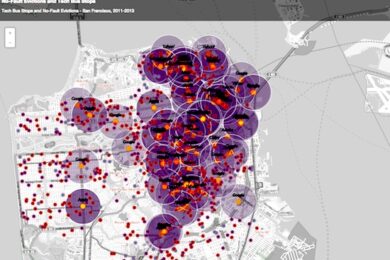When in 1978 punk quartet Crime recorded the tracks that would make up their San Francisco’s Doomed LP, I wonder if they could smell the city burning. For over thirty years on, its soul is on fire.
As Crime foretold, the elegies for the city have been coming in thick and fast for a few years now. There’s been mourning of the ‘yuppification’ of a longstanding subcultural haven for the marginalised or progressive of thought, a sense that a city that fostered powerful civil rights movements will never do so again. This is, of course, a familiar pattern of gentrification and redevelopment that is familiar in so many other Western cities, including London. Just as California has Silicon Valley, Shoreditch – a former artist’s mecca on account of its cheap rent – has Silicon Roundabout.
San Francisco’s Mission District has lost some 1,000 Latino families and gained 2,900 white ones in recent years, leaving many low-income residents homeless, or on the verge of becoming homeless. City-wide, the African-American community has dropped from 13.4 per cent in 1970 to around five per cent today. On his hip-hop blog, Bay Area journalist Davey D blamed the police for this, writing that "as more white folks have been moving in, many black and brown folks, who long made up the majority of folks living in the Mission, have noted they are frequently being profiled and stopped by police. They are often viewed suspiciously, even though they have lived there for generations. Many feel that they are being made to feel unwelcome in their own neighbourhoods, and police harassment is part of a larger process to make it so uncomfortable that folks move out." Indeed, in the aftermath of Ferguson, racial tensions are running high, with 30 people arrested for protesting in October 2014.
Homelessness is a major issue too, and according to the San Francisco Chronicle, currently affects over 6,400 people, largely because the new mayor has shifted priorities from homelessness onto job creation and tech promotion. It’s estimated that around 2,200 school students lack permanent homes and even if their families do manage to obtain a sacred rental subsidy, it’s getting harder to find a property to spend it on in San Francisco because landlords can make so much more renting their properties to big earners.
On June 13, 1979, the acting Mayor Gordon Lau signed the first rent control law, something that the Tories abolished over here with the Housing Act of 1980. It was intended to temporarily freeze rents, combat inflation and afforded rent control protections for most tenants in San Francisco, with just 15 causes for eviction.
But all of that was undone in 1986 with the passing of the Ellis Act. This allowed property owners to evict tenants in order to get out of ‘the rental business’. Now this law is frequently being used as a way to sell a house off for profit as landlords and speculators take advantage of the wealth being generated by the tech industry, displacing poor and working class tenants to create housing for the wealthy.
As of January 2015, the average apartment rent within ten miles of San Francisco is $3,469, even higher than New York City. And at the rotten core of all of this? Technology.
‘Tech Boom 2.0’ (number one taking place in 1996 when Mayor Frank Jordan installed the first fibre optic cable) has seen Google, Facebook and Apple all setting up shop south of the city. This has coincided with a surge of evictions – many of them illegal – displacing long-time tenants. According to anti-gentrification activist Erin McElroy, the income gap between the poor and the rich is growing more rapidly in San Francisco than in any other US city. McElroy is part of a group called Eviction Free San Francisco, who organise direct actions with tenants facing eviction. "We protest the speculators, the material impact of the tech industry, and collusions between elected officials and corporate interests," she explains.
One of the biggest evictions they’re currently fighting is that of 812 Guerrero Street. This particular case is almost cartoon-like in its commitment to imagined cliché. Jack Halprin, head of Google’s eDiscovery (cue: pinstriped, cigar-smoking fat cat lawyer) is currently Ellis Act-evicting six tenants at 812 Guerrero (cue: crushing people like bugs underfoot) so that he can create a private mansion for himself. He’s already displaced one tenant there through an illegal OMI (owner-move-in) eviction over a year ago now.
This campaign has seen the group boycott Google commuter buses – the shiny white shuttles which have come to symbolise gentrification, largely because there are often more evictions grouped closer to these bus stops. They’ve also disrupted Google conferences, demanding that Google pressure their employee into rescinding the aforementioned eviction. There is, of course, a Change petition doing the rounds.
"On the whole, we’re seeing the city largely privilege tech at the expense of long-time residents," says McElroy. "Small mom and pop businesses – local restaurants, laundromats, etc – are going under left and right as new gentrifiers are more interested in frequenting up and coming bourgeois shops. So the tech industry is leading to massive dispossession across the city, and across the Bay Area for that matter."
In October, the city’s last lesbian bar, the Lexington, shut down and the LGBT-friendly Polk Street – scene of the Compton cafeteria riots in 1966 – has suffered drastic changes in the name of urban renovation, where strip clubs, homeless encampments and off licences are being replaced by overpriced nightclubs and high-end apartments. As testament to its impact, the city’s LGBT History Museum has run a series of seminars looking at just that, called The G Spot: Gentrification, Transformation and Queer San Francisco.
Punk rock has of course always been a vital force too, with countless bands having formed in SF, from the Mutants to the Dead Kennedys. The Jello Biafra-owned label Alternative Tentacles has been going since 1979, the same year that Flipper were conceived and a few years before long-running punk zine Maximum Rock & Roll was set up by the late Tim Yohannan. There’s all-ages venue 924 Gilman Street, and more recently, garage, noise-pop and post-punk bands like Thee Oh Sees, Coachwhips, Mikal Cronin, The Fresh & Onlys, Ty Segall, Brilliant Colors and Erase Errata – among many, many more – all doing their thing beneath the blue Californian sky and San Francisco fog.
Formerly of Grass Widow and now Cold Beat, Hannah Lew has been making music in SF for well over a decade. She says that the DIY community has begun to fracture, notably due to the mass exodus of musicians and artists to LA. "I’d say half of our scene moved because it’s cheaper to live there," she says. "When I came back to SF in 2003, there were tons of artists and musicians thriving and moving to and from the Bay Area… what has happened here recently is that there are some people making a ton of money and creating a dynamic where people who have less money cannot compete with the rents they can afford. There has also been a rise in foodie culture and a lot of lifestyle stores – all catering to people with money to spend. These days there are less and less interesting bands."
She continues. "Musicians and artists/people engaged in critical analysis about our world do not make the same wages that tech people do. Currently the only artists I know who still live here are living with rent control." She refers to the measure as golden handcuffs. "Basically, our rents can’t be raised, but if we move away, we’ll never be able to move back."
Last year, Lew released a 13-track compilation called San Francisco Is Doomed on her own label, featuring exclusively SF bands, from the Thee Oh Sees’ scuzz ‘n’ squall, through Mikal Cronin’s lo-fi moment of reflection and a burst of sunshine psychedelia courtesy of Lews’ husband’s band Night Drives. The title is in homage to the aforementioned mentioned Crime LP and as Lew says "was a little gesture towards creating an outlet for musicians here. The conversation about gentrification started feeling like this dull dialogue. There’s really not much we can do except try to find an outlet for our discontent. I wanted to try to make room for that and create a space for those feelings to live."
Also featured on the compilation is ‘Don’t Sit, Lie’ by Erase Errata. The group have been a vital cog in the San Francisco DIY machine since unleashing their first album Other Animals in 2001. They’ve always dance-partied away at the intersection of no wave, post-punk and pro-queer/feminist politics and their long-awaited fourth LP, Lost Weekend, came out earlier this year after a four-year hiatus. Like all previous albums, it surges with an unrelenting power that shows no signs of fizzing out, despite the band’s shifting priorities. Sure, there are quieter flashes (‘My Life in Shadows’) and on the whole it sounds more considered, but it’s still spun from the same kind of Teflon that makes them feel like they could withstand anything.
I ask Erase Errata drummer and long-time San Francisco resident Bianca Sparta for her perspective on the tech boom. "I have mixed feelings," she tells me. "I use tech everyday and appreciate how it has made my life easier – this interview for instance – but I don’t really like the culture around it here in San Francisco. It seems to attract young professionals and it’s really, really expensive now which is driving out artist types who don’t make tons of money."
She continues. "If you can survive on your service industry job – or, gasp… get a job in tech – and keep your rent-controlled apartment, then great – maybe you can find the time to play in bands or make art, but it’s not very punk anymore. It seems to be a challenge to balance the cost of living here with a quality of life (time/space) found other places. You really have to compromise to live here. I wish the tech companies would have moved into a different area. I think San Francisco would be just fine if Google and Facebook and Twitter moved away."
But McElroy believes that, ultimately, everyone can in fact live side-by-side. "I think that there are ways companies can mitigate their impact. Paying city taxes would be a start. Encouraging employees to not move into units with eviction histories would be another," she suggests. "We’d also like to see companies encourage employees to frequent existing businesses. But on the whole, I think that there is a lot of educational work necessary. It seems that many people moving to the city to work in these corporations maintain immense alienation from the rest of the community once here. These companies largely hire young white men with existing forms of privilege, which facilitates ongoing isolation."
Maybe the idea that these new San Francisco urbanites will start checking their privilege, paying history some consideration and try to preserve the original soul of the city, is too optimistic. What with all the legal loopholes it seems that more and more residents are being robbed of their rights, but what will be left of San Francisco’s inimitable spirit if there’s no one around to preserve it? Is a two-state solution, "where the opposing populations simply slither through and past one another, mutually insulated, like electrical currents in the thicket of wires behind your home entertainment system", the only answer, as this mocking Al-Jazeera piece ponders? For San Franciscans, the time for action surely is now.



